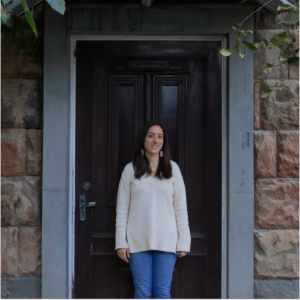17-year-old Nare Arushanyan interviews Ani Jilozian from the Women’s Support Center

Ani Jilozian, director of development at the Women's Support Center in Yerevan, Armenia.
December 6, 2024
Armenia’s new domestic violence legislation is good, but not good enough
Domestic abuse is a destructive and ongoing cycle where one person uses control and harm to overpower another in an intimate or family relationship. It’s a pervasive global crisis, with the World Health Organization (WHO) estimating that one in three women worldwide have experienced physical or sexual violence, often inflicted by intimate partners.
In Armenia, nearly a quarter of women in partnerships have been subjected to physical violence, and nearly half to psychological violence, according to the Netherlands Helsinki Committee, an NGO that promotes human rights across Europe.
Although the country has made significant strides in strengthening its domestic violence legislation this year, it continues to face challenges shaped by deeply rooted social norms, reflected in an old Armenian saying: “A woman is like wool; the more you beat her, the softer she’ll be.”
In April, Armenia’s parliament adopted landmark amendments to the country’s domestic violence law. The Women’s Support Center (WSC), the country’s leading domestic violence support organisation, played a critical role for several years in advocating, lobbying, and passing the legal changes.
“[The Ministry of Labor and Social Affairs] came to our centre and asked for a package of recommendations, most of which were adopted into the law,” Ani Jilozian, director of development at WSC, told Harbingers’ Magazine. “This was a huge stepping stone for Armenia.”
The new package of amendments overhauled the 2017 legislation – Armenia’s first domestic violence law – which served as “a kind of foundation, but was flawed in many ways,” Jilozian said. The previous law had focused on registered marriages, leaving those in unregistered partnerships, same-sex relationships and other non-traditional unions unprotected. Additionally, definitions of abuse were vague, leaving many cases inadequately addressed.
The amendments, which went into effect in June, introduced the concept of “intimate partner” violence for the first time, ensuring broader legal protection for victims from diverse backgrounds. It also expanded the definitions for all forms of domestic violence: physical, psychological, sexual, and economic.
The root of violence against women lies in pervasive, harmful gender norms and stereotypes, common in patriarchal societies. This is reflected in media portrayals, school textbooks, and family dynamics
Ani Jilozian, director of development at the Women's Support Center
While Armenia’s criminal code does not include domestic violence as a stand-alone offence, notable changes include criminalising stalking for the first time and strengthening protocols for emergency protective orders. According to Jilozian, these provisions can be a matter of life and death, offering survivors timely protection.
Additionally, the law now provides registered victims with access to free medical care, acknowledging the health impacts of abuse. Children who witness domestic violence can now receive the same protections as registered victims.
But “while a lot of improvements have been made, there are still major gaps in legislation,” Jilozian said. One issue in the law’s terminology that Jilozian and her team fought against, but was adopted anyway, is the change from “domestic violence” to “domestic and household violence” – a shift that she believes risks watering down the legislation and could lead to misinterpretation.
“We have seen many cases at our centre where a victim is treated as a perpetrator of violence,” Jilozian explained. “For instance, a victim might reach out to the police and be issued an emergency protective order. If she acts in self-defence – scratching or biting the perpetrator – she could be tried as a perpetrator because the law itself allows for misinterpretation.”
Domestic violence often involves cycles of power and control, but Armenia’s legal framework still lacks a clear concept of coercive control – a pattern of behaviours used to gain control by eroding a person’s autonomy – a critical factor in understanding abusive dynamics. Additionally, authorities struggle to implement the law properly.
There are still many societal and cultural barriers that prevent women from speaking out about the abuse they’ve endured. Many Armenian women face social and financial dependency, making it hard to escape. Cultural stigma around divorce, reliance on spousal support, and societal expectations contribute to a cycle where victims feel unable to leave.
“The root of violence against women lies in pervasive, harmful gender norms and stereotypes, common in patriarchal societies. This is reflected in media portrayals, school textbooks, and family dynamics,” Jilozian said.
Another urgent issue is the lack of resources for survivors. With only two shelters in Armenia, the WSC serves as the primary and one of the only domestic violence support centres in Armenia, helping about 300 women and children each year.
Only 10% of their budget comes from the government, making it difficult to meet growing demand especially following recent conflicts that have displaced families and led to a rise in abuse cases. Since 2020, the WSC has seen about a 20% increase in case numbers, according to Jilozian. She says the shortage of shelter space “is a significant concern,” stating that Armenia currently has just 24 places, whereas international standards suggest there should be around 300 for its population of just under three million.





